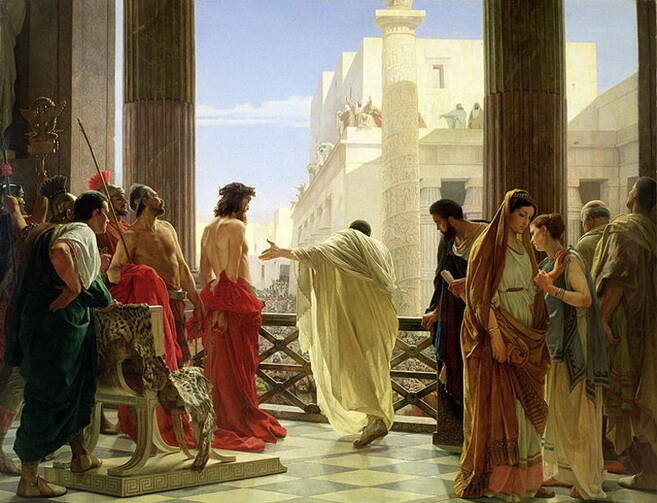The Passion narrative of St. Matthew begins in the 26th chapter. It starts with a subordinate clause linking our Lord’s suffering and death to his prior preaching.
When Jesus finished all these words,
he said to his disciples,
“You know that in two days’ time it will be Passover,
and the Son of Man will be handed over to be crucified” (26:1-2).
The preaching of our Lord in the Gospel of St. Matthew—the Beatitudes, the Sermon on the Mount, the parables—comes to a close as the 26th chapter opens: “When Jesus had finished all these words.” Now the preacher embraces his passion. Now we must hear and ponder deeds, not declarations.
How true Christ is to his own teaching! In Matthew’s sixth chapter, Jesus had told his disciples to “pray to your Father in secret” (6:6). Prayer, he had said, is not many words but our struggle to accept the will of the Father.
Now in the 26th chapter:
He advanced a little and fell prostrate in prayer,
saying, “My Father, if it is possible,
let this cup pass from me;
yet, not as I will, but as you will” (26:39).
St. Matthew tells us that twice more Christ repeated this prayer. The Son embraced the will of the Father, but see the strength and courage this obedience required.
In Roman law, the code by which Jesus was judged, one who refused to defend himself in court was presumed guilty of the charge. In the person of Pilate, Rome made inquiry of the one who claimed to be the Christ.
Now Jesus stood before the governor,
and he questioned him,
“Are you the king of the Jews?”
Jesus said, “You say so.”
And when he was accused
by the chief priests and elders,
he made no answer (27:11).
Rome’s question was glib, without faith. Jesus rhetorically reversed it: “You say so.” When his own Israel posed the same question, when she scornfully asked if this was her Messiah, “he made no answer.”
A speech spun of silence testifies to the truth. Christ does not contest. St. Matthew’s story continues, writ in blood.
Readings: Matthew 21:1-11 Isaiah 50:4-7 Philemon 2:6-11 Matthew 26:14-27:66










